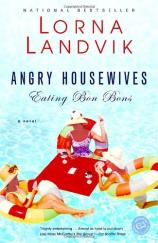Reading Group Guide
Discussion Questions
Angry Housewives Eating Bon Bons

1. During the sixties and seventies, the Angry Housewives smoked cigarettes and threw back highballs-even while pregnant-without knowledge of the harm it could do. If they could have glimpsed their futures then, what do you think would have surprised them most about their future selves? What is one thing you know now that you would have really appreciated being aware of ten years ago?
2. Why do you think groups like AHEB-women who live near each other, raise children together, and bond over books together-persist even in a climate of working moms and in a culture that is flooded with other types of media?
3. Discuss Faith's letters to her deceased mother. What kind of catharsis do they provide Faith, and how do the tone and nature of the letters change as the years go by?
4. Audrey gets a kick out of introducing Kari to strangers as a recently released convict. Discuss the women's jokes, nicknames, and embarrassing moments-how does humor work to solidify friendship?
5. Kari faces a critical decision when Mary Jo forbids her from telling Anders that the baby is his grandchild. Would you be able to keep such a secret? For which character is this secret most constructive; for which is it most destructive?
6. The women suggest that Slip thinks that by wearing revealing clothes Audrey perpetuates her role as a sex object and "subverts [her] real self." Audrey replies that she takes no one's opinion into account when she dresses-she simply likes it. How much does physical appearance burden or bless the women in AHEB? Do you think it is easy to make generalizations regarding persons who dress provocatively?
7. Faith becomes a guardian figure after staying up with the gun waiting for Eric Iverson's return, and keeping watch over Slip in the hospital bed, prepared to confront the Grim Reaper. What do you think are her conscious or subconscious motivations for being ever watchful?
8. Audrey has a talent for sensing upcoming events. In what ways do her capabilities influence how she deals with her family? Does it differ from how they affect her friendships? How much do you believe in psychic phenomena? Would being endowed with such a gift help or hinder one's decisions?
9. Merit is ashamed that a part of her believes her mother's statement that her brave Aunt Gaylene--happily unmarried, fulfilled with friends and books--was "living half a life." What sides of Merit's character produce these contradictory feelings? How do you think the other women of AHEB would respond to this opinion, and why?
10. At the AHEB meeting for The Prime of Miss Jean Brodie, the women toast their favorite and most influential teachers. In what other ways does the act of teaching influence the relationships in this novel?
11. Slip and Audrey allow a conflict between their children to seriously harm their friendship for a short time. If you ever had the desire to openly criticize a friend because of the way he or she raised a child, would you do so? How does Landvik's portrayal of differing parenting techniques and the children they produce function as social commentary within the novel?
12. What do you think caused Faith to (almost absent-mindedly) bring Audrey to Trilby? How did confronting Beau's sexuality help her have the strength to confront the reality of her own past?
13. Merit attributes her quiet acts of rebellion--trash rolled up furtively in her hair, choosing only banned books for AHEB meetings--to her maintenance of sanity during her years of marriage. What do you make of these coping methods? How do they compare to the methods of the other women in AHEB? Discuss your own strategies for staying lucid and balanced when confronted with situations that can be unbearable.
14. Kari and Mary Jo both question the timing and content of their admission to Julia after it's too late. Do you think it would have been wiser to have Julia grow up knowing the truth, or perhaps never knowing at all? How do you feel about Kari's impromptu decision to come clean in front of Mary Jo and without her prior knowledge? Was Julia right to be so upset?
15. How do you feel about the later inclusion of Grant as a member of AHEB? Did you think the inclusion of a male affected their particular group dynamic? What is valuable about inviting men to participate in women's dialogue?
16. Merit eventually finds Paradise, literally and figuratively. Do you believe that good things come to people who wait?
17. At the peace march, Fred states that, "Only by trying to help someone else save their life could I save my own." What do you make of this statement considering the horrors he experienced during the war? Do other characters in the novel embody or contradict this notion? Are certain characters better described as saviors than saved?
18. How are midwestern values portrayed in this book? In what ways might the book have differed if it had been set in the northeast or the south?
19. Slip is described throughout the book as the strongest--physically--of the Angry Housewives, in addition to her dynamic will and stalwart convictions. What emotions are stirred when someone who is perceived as invincible suddenly becomes critically ill? How does she continue to display conviction and energy? Do you think she will prevail?
20. Audrey says she believes in luck and God acting in tandem. What events in her life do you think contributed to this belief? How much weight do you give this sentiment regarding your own life? Do you think people tend to attribute life's painful events more to luck or to God? What about the joyous events?
21. Did you like the format of the book? How did giving every character the opportunity to voice their thoughts support the all-for-one and one-for-all theme of the book and the club itself?
22. This book covers a lot of ground, both personal and political. What do you think the most important lesson these women learn over thirty years is? Which characters were most ripe for change with the political and cultural tide? Whose story did you think most embodied the emergence of women as a growing force outside the home?
23. In order to attain a greater understanding of herself, Faith utilizes therapy, learns from her friendships and culls inspiration from books. How do these three supplement each other as means of self discovery? Which books and authors have inspired you most through the years?
24. What did you think of Merit's idea to unite mothers around the world to stop war and halt violence? Were you surprised this notion came from her?
25. Slip tells Merit that re-dubbing their book club Angry Housewives Eating Bon Bons would be taking their husbands' words and "giving them and their chauvinism the finger." What other subversive techniques do the women display for giving chauvinism the finger? Do you feel it's an apt name for the club and all it turns out to be?
26. Discuss Kari's notion that her heart was able to put itself back together after the loss of Bjorn much like a lizard that can regenerate a tail. Do you think this sort of regeneration would have ever been possible without the arrival of Julia?
27. Marjorie McMahon has a plethora of nicknames: Slip, Warrior Bear, the Big Kahuna; and she is called everything from a leprechaun to a member of a "bloodstained group of nuts." What in her character lends itself so well to these various labels? Which do you think is the most accurate?
28. What do you think about Merit's final interaction with Eric Iverson? Was the slap beneath her or just what he deserved?
29. How does AHEB compare to your book club? Are there any ideas in the novel, like themes for meetings, which you'd like to incorporate?
30. Which character was your favorite? Was she or he the one you identified most with?
31. A number of the characters in the book harbor secrets. What does secret-keeping do characters like Faith and Fred, who fear their actual secrets as opposed to Kari or Beau who fear the reactions of others?
Angry Housewives Eating Bon Bons
- Publication Date: February 3, 2004
- Paperback: 448 pages
- Publisher: Ballantine Books
- ISBN-10: 0345442822
- ISBN-13: 9780345442826








